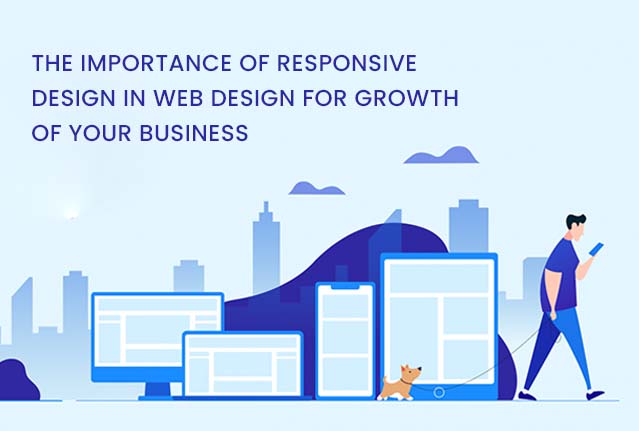

Posted by Sweta Thakur on Mon, 15/05/2023

In the digital age responsive design is a critical component of modern web design that is essential for the growth of businesses. The increasing use of mobile devices has made it imperative for websites to be accessible & user-friendly on all devices, including desktop computers, laptops, tablets, and smartphones. This article explores the significance of its use in web design and its importance in achieving online goals.
Essentially, it refers to designing a website in a way that enables it to adapt to different screen sizes and devices automatically. A responsive website adjusts its layout and content to fit the screen size of the device it is being viewed on, ensuring that users can access and use the website seamlessly, regardless of the device they are using.
Having a strong online presence is vital for the growth of any business in today's digital age. With more and more people using the internet to search for products and services, having a website that is visually appealing and user-friendly is critical. Professional web design companies, such as web design and development company or creative web design company in India, can play a significant role in helping businesses achieve their online goals.
It is a crucial aspect of modern web design as it ensures that a website is accessible and user-friendly on all devices, including mobile devices. A website that is not optimized for mobile devices can lead to a poor user experience, resulting in a high bounce rate and lost opportunities for conversion. Therefore, it is essential to prioritize it in web design to ensure the growth of your business.
Improved User Experience
A responsive website provides an excellent user experience by ensuring that the website looks & functions perform perfectly on any device. This means that users can easily navigate through the website, find what they are looking for, and make purchases or contact the business without any hassle. A good user experience leads to higher engagement, longer time spent on the website, and increased conversions, which ultimately leads to the growth of your business. A website that is optimized for all devices ensures that users can easily navigate and interact with it, regardless of the device they are using. This leads to a better user experience, increased engagement, and higher chances of conversion.
Increased Traffic
Rather than a non-responsive website a responsive website is likely to rank higher in search engine results pages (SERPs). This is because search engines such as Google give preference to websites that provide a good user experience, and a responsive website does just that. Higher rankings lead to increased visibility and traffic, which can ultimately lead to more leads and sales for your business. This is because search engines such as Google give preference to websites that provide a good user experience, and a responsive website does just that. Higher rankings lead to increased visibility and traffic, which can ultimately lead to more leads and sales for your business.
Cost-Effective
Designing and maintaining separate websites for desktop and mobile devices can be costly and time-consuming. A responsive website eliminates the need for separate websites, which saves time and money. In addition, a responsive website is easier to maintain, as changes made to the website apply across all devices. With a responsive website, you don't need to create separate versions of your website for different devices. This can save you time and money in the long run, as you only need to maintain one website instead of multiple versions.
Brand Image
A responsive website helps to improve your brand image. A website that looks outdated or does not function well on mobile devices can give a negative impression of your business. A responsive website, on the other hand, looks modern and professional, which can help improve your brand image and reputation.
Competitive Advantage
A responsive website gives you a competitive advantage over other businesses in your industry. With more and more people using mobile devices to access the internet, a responsive website can help you reach a wider audience and stay ahead of the competition.
Higher Search Engine Rankings
Search engines like Google give priority to websites that are mobile-friendly and responsive. Therefore, having a responsive website can improve your search engine rankings and increase your online visibility.
Better Conversion Rates
A responsive website can lead to higher conversion rates, and increased sales & leads because users are more likely to stay on your site and take action if they have a positive experience.
In today's digital era, a responsive website is crucial for businesses. Search engines like Google prioritize mobile-friendly and responsive websites, which can improve your search engine rankings and online visibility. A responsive website also leads to higher conversion rates because users are more likely to stay on your site and take action if they have a positive experience. This can translate to increased sales, leads, and revenue for your business.
Therefore, investing in responsive design is essential for the growth and success of your business. By ensuring that your website is accessible and user-friendly on all devices, you can improve your user experience, search engine rankings, conversion rates, and overall online presence. Professional web design companies, such as those in India, can help businesses achieve their online goals by designing and developing responsive websites that provide an excellent user experience, increase traffic, are cost-effective, improve brand image, and give a competitive advantage.
In conclusion, a professional web design company in India, such as a Web design and Development Company or a creative web design company, can help businesses achieve their online goals by designing and developing responsive websites. Thus, responsive design is an essential aspect of modern web design that cannot be ignored & investing in it can lead to the growth and success of your business in the digital age.